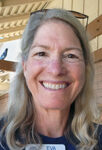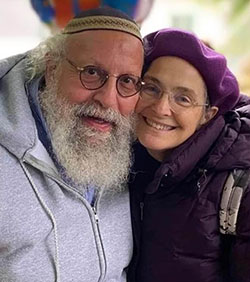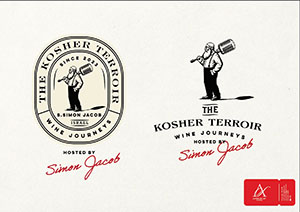By Eva Trieger


RAMONA, California — In Bereshit Psalm 104:15 we read, “You give us wine that makes us happy…” Indeed wine has a paramount role in so many Jewish rituals and simchot. Wine ushers in Shabbat, enables us to drink to obliterate notions of enemies on Purim, and show our gratitude for G-d’s miracles at the sederim. In fact, in some rabbinic literature the vineyard is symbolic for our Torah, requiring our tending and protection.
Yet, kosher wine has evolved radically since the days of Noah. In ancient times vineyards and wine presses covered the land of Israel, but during Ottoman rule (1517-1917) as drinking alcohol violates Muslim law, the inhabitants wiped out almost all of the grape vines and production infrastructure. In fact, even 30 years ago, kosher wines were only available in extremely limited numbers, and not considered to be very tasty. Even though the beautiful land of the Judean Hills featured fruit orchards, there were very few grape vines. Today, 98% of Israel’s agriculture in those same Judean Hills is grapes for wines. Simon Jacob, my brother-in-law and host of the podcast The Kosher Terroir, explained this evolution and how he came to be so involved in learning about global kosher winemakers and vineyards.
In a recent video call, Simon shared a great deal about his induction into the kosher wine world. Though he and my sister made aliyah eight years ago Simon had become involved in wine and wine clubs while still in America. Starting in Manhattan, kosher wine lovers held monthly meetings called Rosh Chodesh Clubs (RCC). Club members would each bring a bottle of a delicious kosher wine to share with others. The wines had to be of a minimum age, and considered high quality, before they were permitted into club tastings. As the idea caught on, the clubs soon incorporated the idea of adding gourmet chefs to their evening festivities.
The RCCs arose in Lakewood, NJ, Toronto, San Diego and Los Angeles. They branched out globally to Beit Shemesh, Jerusalem, London. With the expansion came great cross pollination. The clubs built new friendships among different segments of Jewish communities from Anglo to Chassidishe to Syrian, all with the common interest in tasting quality wines.
To more fully understand this wine enthusiast, it helps to know a bit more about his early indoctrination into oenology. Simon’s father, Al Jacob, z”l, was very interested in wines. Born in Calcutta, India, Al met and married Simon’s mom, Doreen, while studying in London. The couple came to the states where Al became a very successful actuary. After building a prosperous business, he toasted his success by drinking and collecting world class wines. He visited wineries all over the world and helped fund wineries that were developing in California. Al became close to lots of winemakers of innovative high-end wines.
Simon’s first memory of drinking kosher wine was while attending a farbrengen with his chazan. At the time, the environment felt foreign to him. High in the bleachers, occupied by thousands of dancing and singing men, this 15-year-old found himself standing and praying not to die from a collapse of the flimsy structure. They sang niggunim, going up afterwards to stand in line in front of the Lubavitcher Rebbe, to have little plastic shot cups filled with wine and have the Rebbe answer each one’s blessing with a hearty “Amen.”
Over the years, and through his travels, Simon has developed a more sensitive and discerning palate and has discovered several wines that he enjoys sharing with guests, family and friends. Before creating the podcast, Simon summed it up by saying, “wine isn’t about wine. It’s about people. Wine makes the conversation easier and allows people to connect.”
The distinction between kosher wines and those that are not kosher has often been misconstrued. A kosher wine must be handled from harvesting, crushing and bottling by Shabbat-observant Jews. Additionally, kosher wines cannot have non-kosher fining agents nor non-kosher additives. Commonly, there is a further distinction in Kosher wine status. This is between meshuval and non-meshuval wines. A meshuval wine is cooked at a high temperature for a short time in its process. This wine may be handled by anyone, making it convenient for parties, bar mitzvahs etcetera, especially in the United States. Non-meshuval wines can only be handled by Shabbat-observant Jews after their sealed bottles are opened.
I wanted to know if Simon’s plan had always been to make aliyah. He told me that he and my sister, Barrie, had known, since they married, that this was a shared dream. After eight of their nine children had made aliyah, the choice was self-evident. One son remains in the US with his own family of eight. Majority rules!

Upon making aliyah, Simon promised himself two things: “1) I would learn with a rabbi on a regular basis and 2) I would get to know Israeli kosher wine makers.” While he does learn with a rov, “not nearly enough,” he has fulfilled the second promise. This goal led to his now one-year old podcast, The Kosher Terroir.
The podcasts are amazing interviews with winemakers from all over the world. Many are in Israel, but others are in Spain, South Africa, California and France. Each of these interviews reveals the winemaker’s passion for the winemaking process, but also his/her commitment to producing kosher wines and their devotion to Klal Yisrael. The questions are personal with an obvious rapport and camaraderie evidenced by both interviewer and interviewee. Simon stated that “there hasn’t been an episode where I haven’t learned something.”
With over 8,000 downloads representing 56 countries, it is clear there is a following for The Kosher Terroir. The winemakers that Simon interviews hail from a host of different careers, and various backgrounds, and different religious levels. The common thread, the unifying link, is the desire to grow grapes and produce high-quality wines that can be consumed by observant Jews. Not all of the vineyards are strictly kosher, but those that produce kosher wines adhere to very stringent laws, taping off barrels and vats, ensuring that they are touched only by those who are shomer shabbat.
Personal favorites of Simon’s include Pontet-Canet, 2003. This is a deep red Bordeaux. He also enjoys many of the new Israeli whites just released, “V” by Yaacov Oryah and even the very popular blue bottle of Bartenura moscato.
I found it interesting that significantly more kosher wine is consumed in America than in Israel. Especially, in light of the current situation, Simon emphasized how supporting Israeli winemakers is essential. Starting with COVID, and continuing with the war, the wine industry has been heavily impacted. Wines that previously were sold and consumed in restaurants have taken a hit. Many restaurants closed, tourism was down, and the overall hospitality industry suffered. With soldiers called up, there are fewer opportunities for families to go out together. Many people have been displaced or evacuated from the northern Israeli towns as well as those by the Gazan border. Further, with farm workers sent to combat or military service, there is a labor shortage for planting and harvesting.
How can Americans help? I queried. Simon said, “Get on a plane and come here and see it for yourself. Enjoy the wines and show support.” There are tasting rooms around the country that have opened and they invite visitors to explore these kosher wines, made in unique styles influenced by international vintners. If travel isn’t possible, kosherwine.com can bring these delicious wines to your door.
I was eager to know what Simon has discovered about Israel since making aliyah in 2016. “I can’t tell you how safe it is to grow children here in Israel. It’s what it was like in the United States in the 1940s and 50s. If a kid is on a playground and does something foolish or dangerous, anyone grabs him and reprimands him. It’s a lovely place and everyone cares about each other’s welfare.” And given the fact that Simon is a grandfather to many, many, many children, he knows whereof he speaks!
On the topic of living in Jerusalem, Simon stated, “We’re living in the fishbowl of kedushah and Judaism. It isn’t something we need to seek out or infuse into ourselves. I wake up each morning and walk to synagogue, looking up at the Old City. Everything here is about Judaism. Jerusalem is the biggest city in Israel, and everywhere there is the sense of ‘Welcome Home.”
The Kosher Terroir podcast may be downloaded here, and just to give you a sampling, here are links to three great episodes:
https://www.buzzsprout.com/2210843/15339769 (Herzog episode)
https://www.buzzsprout.com/2210843/15108331 (Kosherwine.com episode)
https://www.buzzsprout.com/2210843/14552782 (Hagafen Winery episode)
L’chaim!
*
Eva Trieger is a freelance writer based in the San Diego suburb of Ramona, California.
LOVE IT!